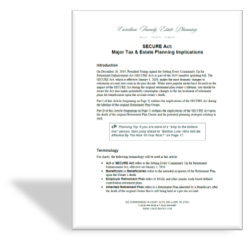
As of January 1, 2025, North Carolina adopted the Uniform Electronic Wills Act, allowing certain wills to be created and signed digitally. While this may look like a modernization of estate planning, in practice, attorneys are approaching it cautiously. The law is so new that there are no court precedents to interpret how it will be applied. That uncertainty can create risks for families who rely on electronic wills without fully understanding the consequences.
What Is the New North Carolina Uniform Electronic Wills Act?
The new act provides a legal framework for the creation and acceptance of electronic wills. This means a will can now be created and signed electronically, as long as it meets all the strict statutory requirements. The law also creates a new path for probating a digital copy of a paper will, a process that was previously difficult and expensive.
Defining an "Electronic Will" in NC Law
An electronic will, as defined by the new law, is a will executed electronically. This means it's a document that exists in a digital form, like a computer file. It is signed by the testator using an electronic signature and attested to by at least two witnesses who are physically or electronically present as required by N.C. Gen. Stat. § 31-3.3.
The Hidden Concerns Around Electronic Wills
Unsettled Law
Because this law is brand new, there’s no track record of how courts will handle disputes. If a problem arises, it may take years of litigation to find clarity.
Technology and Security Risks
Digital wills must be stored securely and accessed after death. Questions remain about tamper-proof storage, loss of passwords, and ensuring the will is actually found when needed.
DIY Pitfalls
Online tools and “do-it-yourself” electronic wills heighten the risk of errors. Improper signatures, missing witnesses, or storage mistakes may not be discovered until after death, when it’s too late to fix.
Litigation Concerns
Because the law is new, electronic wills could be easier to contest. Questions about identity verification, undue influence, or whether someone off-screen was present during signing could spark disputes.
Challenges for Older Adults
For many, navigating the technology needed to create and manage an electronic will is intimidating. This increases the chance of errors or reliance on unsafe DIY tools.
The Safer Option (For Now)
While electronic wills are legally recognized in North Carolina, they come with risks that families shouldn’t ignore. Traditional, properly executed paper wills remain the most reliable option until more legal clarity and security safeguards emerge.
If you’re considering your estate planning options, talk with an experienced estate planning attorney. We can help ensure your wishes are protected without exposing your family to the risks of unsettled law.
Call (919) 443-3035 or click here to schedule a case assessment with our team today.







